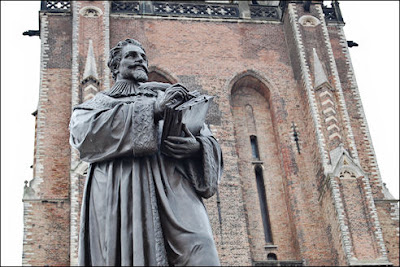First, a quick analysis of his phrase:
The way--exemplum--example? Yes.
The truth--doctor--cure, mend? No. More of a religious teacher"
1300, doctour, "Church father," from Old French doctour and directly from Medieval Latin doctor "religious teacher, adviser, scholar," in classical Latin "teacher," agent noun from docere "to show, teach, cause to know," originally "make to appear right," causative of decere "be seemly, fitting," from PIE root *dek- "to take, accept."?http://www.netherlands-tourism.com/hugo-de-groot-monument-delft/
The life--et Dater vitro etenate--data of life eternal? More of "date when eternal life begins..."
date---early 14c., "a period or stretch of time, a season, an age;" mid-14c., "time when something happened or will happen," from Old French date (13c.) "date, day; time," from Medieval Latin data, noun use of fem. singular of Latin datus "given," past participle of dare "to give, grant, offer," from PIE root *do- "to give."
A Quick Glimpse of His Life
I came away with a basic sketch---Grotius was a Dutch child prodigy who lived in the 17th century. He attended Leiden University at age 11 and made a career of exploring the inter-relationships of Biblical doctrine and natural law. Engaged in the Armenian-Calvinism debates as well as contributing to Enlightenment philosophy, Hugo Grotius was smart enough to recognize the limits of academic knowledge. Briggs and I agreed this morning that he reminds us of Solomon and Ecclesiastes:
Grotius' personal motto was Ruit hora ("Time is running away"); his last words were "By understanding many things, I have accomplished nothing" (Door veel te begrijpen, heb ik niets bereikt). -Wikipedia
Amid all this philosophizing on matters of law and faith, he and his wife, Maria van Reigersberch, had 8 children, 4 who lived to adulthood. He was imprisoned in Loevestein Castle for his controversial writings and escaped in a book chest to France where he wrote the bulk of his works. Even the end of his life was dramatic as he was shipwrecked traveling from Sweden from France, then died of illness.
Why bother with Grotius? One could argue such bunny trails are sideways energy. I assert that we understand our faith better by exploring the great heritage of those who have taken pains to study and apply His word through the centuries.


No comments:
Post a Comment